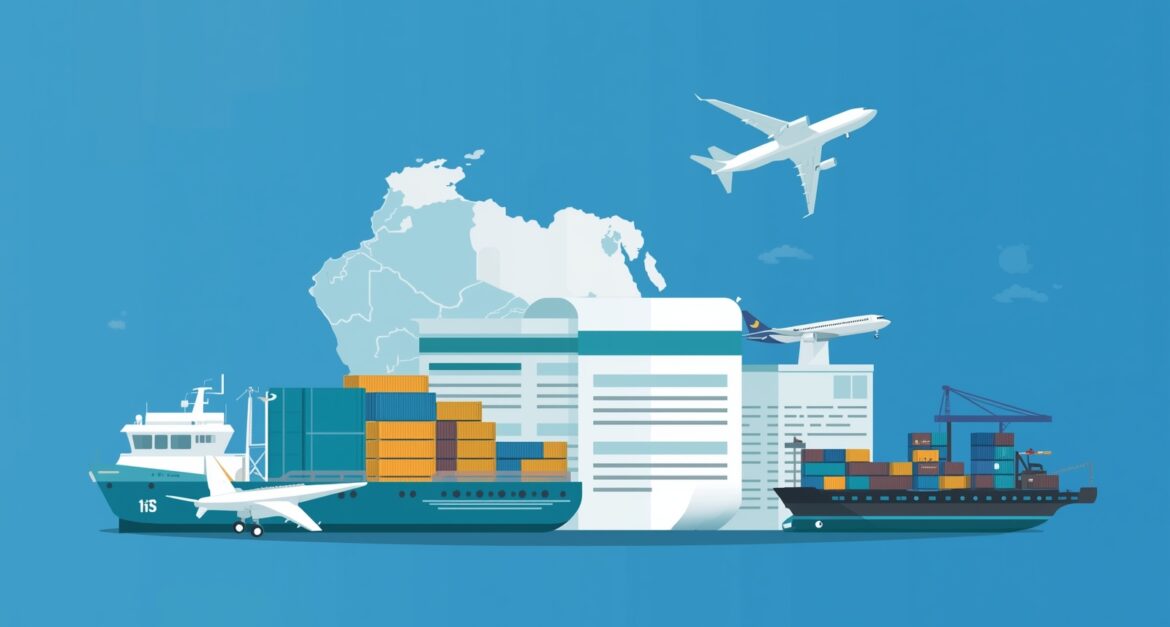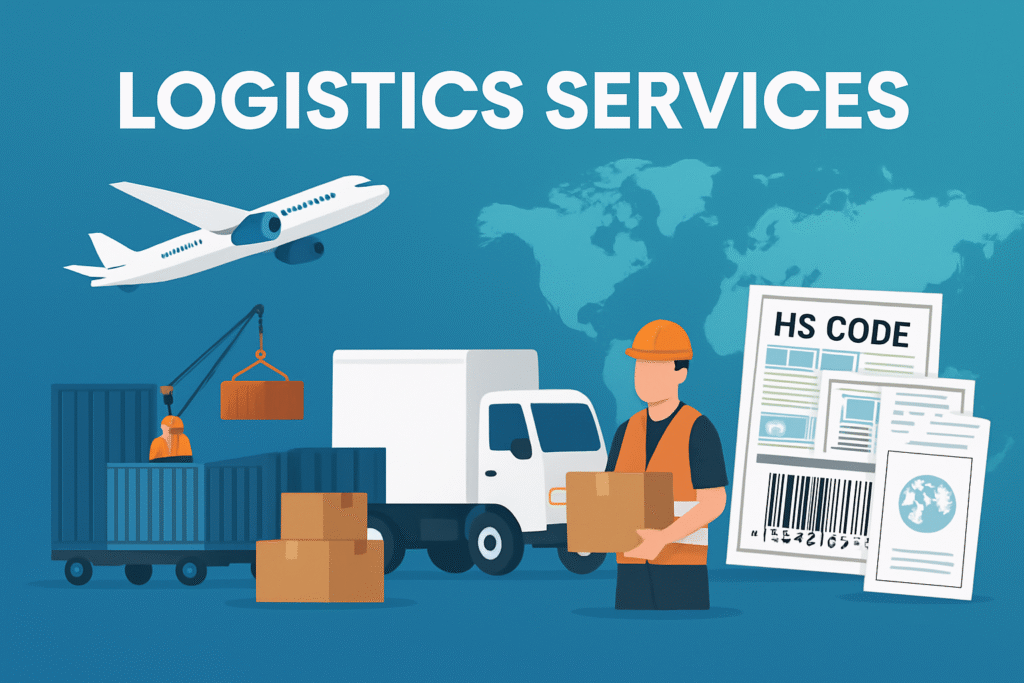
Introduction: The Hidden Language of Global Trade
Each shipment across any international border does not only carry physical goods but it carries an identity. That identity does not happen to be achieved by the brand name, but by a numeric code that is global, referred to as the HS Code (Harmonized System Code).
In the absence of HS Codes, clearance of customs would degenerate to anarchy. It was impossible to measure duties, limit goods, and the data of international trade would be inconsistent. The knowledge of HS Codes is not a luxury as an importer or exporter in a rapidly changing Saudi Arabian logistics market, it is a must to comply and to control costs and time.
The present article is a comprehensive guide on the topic of HS Codes and their purpose, construction, and the reasons why they are essential to businesses that utilize logistics services in KSA.
What is an HS Code?
The HS Code or the Harmonized Commodity Description and Coding System is a global classification of commodities that was first introduced by World Customs Organization in 1988.
Today, HS Codes are used by:
- 200+ countries for customs administration.
- Covering 5,000+ product groups.
- Accounting for 98% of world trade.
Simply put, HS Codes create a common language for global trade. When you declare “apples” in your invoice, customs in another country may interpret it differently. But when you write 080810 (fresh apples), every customs officer worldwide knows exactly what’s being traded.
The Structure of HS Codes Explained
Alpha codes consist of numbers that appear random at first sight. In actual sense, every figure has a significance.
- First 2 digits (Chapter): Orders (e.g. 08 = Fruits & Nuts).
- Next 2 digits (Heading): More specific group (e.g. 0810 = Other Fruits).
- Next 2 digits (Subheading): Detailed description (ex. 081010 = Strawberries).
This 6-digit international HS Code is consistent worldwide.
Country-Specific Extensions:
- Saudi Arabia: Uses 8–12 digits for tariff precision.
- USA (HTSUS): 10 digits.
- EU (CN Codes): 8 digits.
Example:
- HS (International): 870321 → Passenger Cars under 1,000cc.
- Saudi Arabia Tariff: 87032110 → Gasoline-powered cars below 1,000cc.
This extension allows countries to control duties, regulations, and licensing.
Why HS Codes Matter in Logistics & Trade
1. Customs Duties & Tariffs
HS Codes directly impact how much you pay. A misclassified code may double your duties.
Example:
- Textile Fabric (HS 5208) duty = 5%.
- Wrongly classified as Finished Apparel (HS 6204) duty = 12%.
That 7% difference could cost millions annually for large importers.
2. Regulatory Compliance
Some goods require licenses (pharmaceuticals, chemicals, electronics). HS Codes are the trigger points for restrictions.
- HS 3004 → Medicines → Needs SFDA approval in Saudi Arabia.
- HS 8501 → Electric motors → May require SASO compliance.
3. Trade Statistics & Economic Planning
Governments use HS Codes to track imports/exports. For instance, Saudi Arabia tracks oil equipment imports to support Vision 2030 industrial policies.
4. Business Efficiency
Correct HS Codes = fewer delays, faster clearance, smoother cash flow.
The Risks of Misclassification
Misclassification is not a minor error—it’s a business risk.
The Main Risks:
- Financial Loss → Overpayment of tariffs.
- Delays at Ports → Storage fees build up.
- Fines & Penalties → Customs authorities impose charges.
- Reputational Damage → Suppliers lose trust.
- Seizure of Goods → For restricted or banned items.
How Does It Work?
The Hs code is the universal language of trade that is based on the rules of classification and hierarchical categories. In case an importer or exporter prepares a shipment, the description of each item will be necessary and a code will be assigned. The exporting and importing country customs officers then use the same code to identify what the goods are, impose the appropriate tariffs and whether the good is restricted or regulated.
To illustrate the point, a company that sells plastic chairs cannot possibly explain them using free-text representation. They have to group them into the HS Code 940370, which deals with Furniture of plastics. After coding, this classification will guarantee that the customs in Saudi Customs and the country where the product is exported that they will be aware of the product being traded.
This process has three main steps:
- Identification → Determine product composition, usage, and function.
- Classification → Assign the product to its correct HS Chapter, Heading, and Subheading.
- Validation → Match the HS Code against local customs rules and tariff schedules.
In Saudi Arabia, once a business submits the HS Code, it is compared to the database and integration systems such as SABER of Saudi Customs to check the compliance with the regulations. When the classification is made correctly, the goods will pass smoothly and when done incorrectly, they may be delayed, fined or sometimes rejected.
By relying on HS Codes, businesses gain consistency, predictability, and legal compliance, ensuring shipments do not get trapped in a bureaucratic maze.
Why Is This Important?
At first, HS Codes may seem like minor details. But in reality, they are the single most important factor in determining whether your international trade is profitable, compliant, and efficient.
Every percentage of duty counts in industries where margins are already thin. A misclassified HS Code can inflate costs and erode competitiveness in global markets. For example, a Saudi company importing raw materials for manufacturing may lose millions if duties are misapplied over a year of shipments.
Beyond money, the importance of HS Code in logistics services lies in compliance and reputation. Governments use HS Codes to enforce national security, consumer safety, and trade agreements. Incorrect codes may trigger compliance audits, damage a company’s trade credibility, or restrict market access. In highly regulated industries like pharmaceuticals and oil & gas, errors in HS coding can even halt entire projects.
For Saudi Arabia, a country accelerating its position as a global logistics hub under Vision 2030, compliance is not optional. Accurate HS Codes are the key to building trust with regulators, avoiding penalties, and maintaining smooth cross-border trade. For businesses, this means faster customs clearance, optimized costs, and stronger supply chain resilience.

How We Are Best From Our Competitors
Many companies offer logistics services in Saudi Arabia, but when it comes to HS Codes, not all providers are created equal. At Palm Horizon KSA, we set ourselves apart in three crucial ways:
- Expert HS Classification Team
Unlike competitors who rely on generic databases or manual guesswork, our experts specialize in Saudi tariff codes and WCO nomenclature. This ensures accuracy down to the extended 10–12 digit levels required locally. - Technology-Driven Solutions
We integrate AI-driven tools with human expertise. This hybrid model reduces classification errors and provides clients with real-time duty calculation, saving both time and money. Competitors often lack this level of automation and insight. - Regulatory Alignment
Saudi trade regulations evolve rapidly, particularly under Vision 2030 initiatives. Our team stays aligned with Saudi Customs, SABER, SFDA, and SASO requirements, ensuring your shipments always meet compliance standards. Many providers lag in updating their knowledge base, exposing clients to unnecessary risks. - Proven Track Record in Sensitive Sectors
From pharmaceuticals and e-commerce to oil & gas project cargo, Palm Horizon has successfully navigated HS Code compliance for industries where precision is mission-critical. Few competitors in the KSA market can match this breadth of sectoral expertise. - End-to-End Logistics Support
Beyond classification, we provide customs clearance, warehousing, last-mile delivery, and compliance consulting—a complete ecosystem that ensures your goods are handled with accuracy from origin to final delivery.
When compared with competitors who may treat HS Codes as just another paperwork step, Palm Horizon KSA treats them as a strategic advantage for clients. This results in faster clearances, reduced costs, and a stronger global trade presence.
Case Studies: Saudi Arabia Examples
Case 1: E-Commerce Importer in Riyadh
A local e-commerce business imported phone cases but misclassified them under “electronics accessories.” Customs reclassified them under “plastic articles,” with a lower tariff. The importer had overpaid for 18 months, losing SAR 2 million before correction.
Case 2: Oil & Gas Equipment Supplier
A drilling company imported specialized valves but misclassified them. Customs seized the shipment until correct classification was provided. The delay caused project downtime worth SAR 10 million.
Case 3: Pharmaceutical Importer
A Riyadh-based pharmaceutical distributor misclassified nutritional supplements as medicines. Result: SFDA compliance checks delayed clearance by 45 days, causing stockouts.
Implementation: How to Classify Correctly
Businesses can protect themselves by adopting a step-by-step classification process:
- Identify the Product
Break it down: material, composition, function, and usage. - Use Official Tools
- WCO HS Nomenclature.
- Saudi Customs Tariff Database.
- WCO HS Nomenclature.
- Check Explanatory Notes
WCO provides detailed guidance for classification. - Cross-Check with Authorities
Verify with Saudi Customs if unsure. - Leverage Technology
AI-driven classification tools reduce errors. - Partner with Experts
Logistics providers like Palm Horizon KSA specialize in HS classification and customs clearance services.
Industries Most Affected by HS Codes
- E-Commerce → Ensures buyers pay the right duties.
- Automotive → Precise classification for spare parts & vehicles.
- Pharmaceuticals → Avoids compliance issues with SFDA.
- Oil & Gas → Complex equipment often misclassified.
- Agriculture & Food → Controls safety standards & bans.
In Saudi Arabia, HS codes play a central role in Vision 2030 sectors, including industrial manufacturing, renewable energy, and advanced logistics.
Competitor Comparison: HS Classification Approaches
| Factor | Businesses Without Expert Support | Businesses Using Palm Horizon |
| Accuracy | Relies on internal guesswork | Verified by HS specialists |
| Cost | Risk of overpayment & fines | Optimized duty payments |
| Time | Delays due to misclassification | Faster clearance |
| Compliance | High risk of rejection | Full alignment with Saudi Customs |
| Scalability | Difficult for large product catalogs | Automated + expert-driven |
FAQs: HS Codes Explained
1. What is the HS Code system used for?
It standardizes classification for duties, compliance, and global trade statistics.
2. How many digits does an HS Code have?
Six digits globally, with extensions (8–12 digits) per country.
3. What happens if I use the wrong HS Code?
Expect delays, higher costs, fines, or even seizure of goods.
4. Who manages HS Codes?
The World Customs Organization (WCO) manages updates every five years.
5. Are HS Codes the same worldwide?
Yes, the first 6 digits are uniform, but national extensions differ.
6. Can technology help with HS Codes?
Yes—AI and automation tools now assist in accurate classification.
7. How can logistics companies help?
Providers like Palm Horizon KSA ensure correct HS usage, saving businesses time and money.
Conclusion: Why HS Codes Define Trade Success
HS Codes are not ordinary figures in the international trade world: they are the basis of compliance, cost control, and efficiency of customs. Incorrect classification implies great losses, and correct codes lead to the smooth logistics worldwide.
For Saudi businesses, where customs laws are strict and trade is expanding, the need for expertise is critical. By partnering with a trusted logistics company in KSA like Palm Horizon, businesses ensure:
- Correct HS classification.
- Optimized duty payments.
- Faster, risk-free customs clearance.
Learn how Palm Horizon KSA supports your global trade at Palm Horizon KSA.





